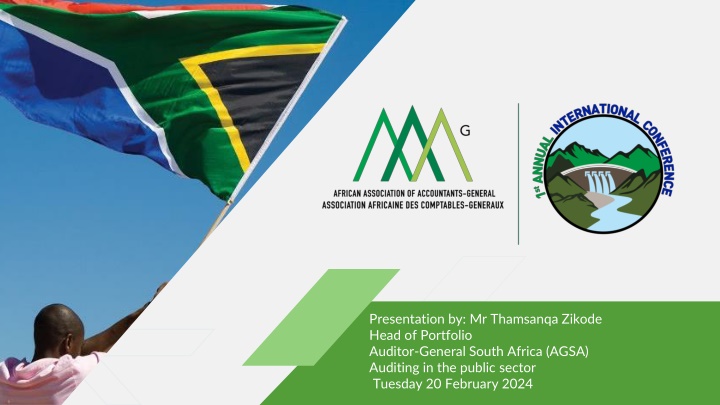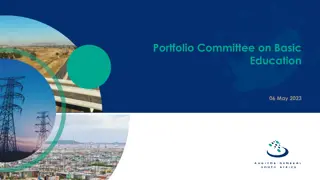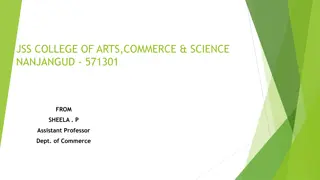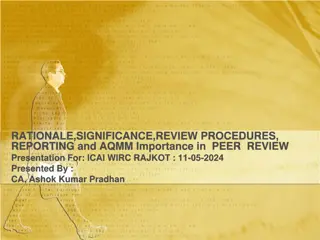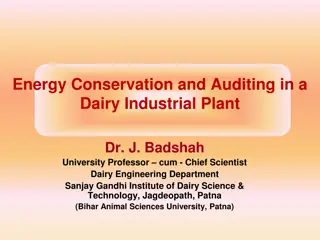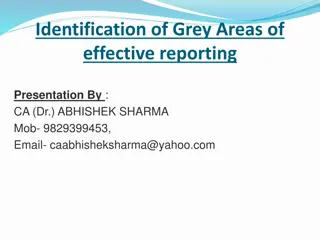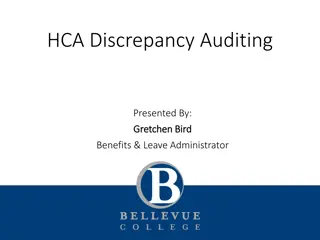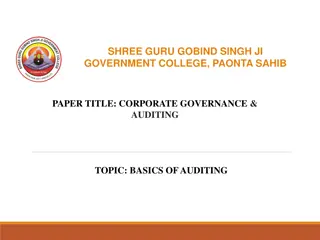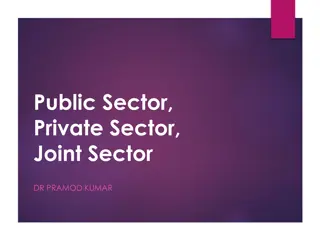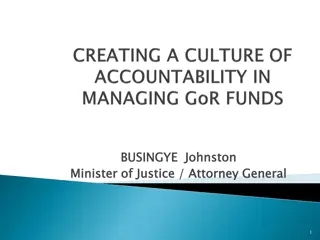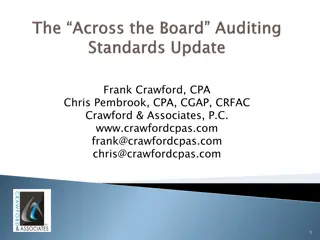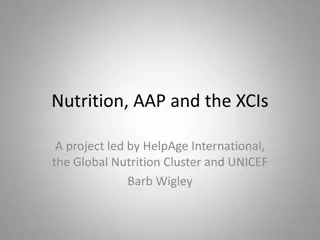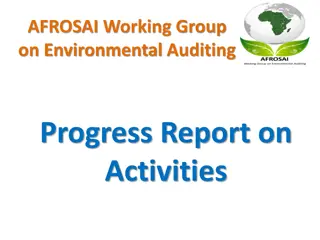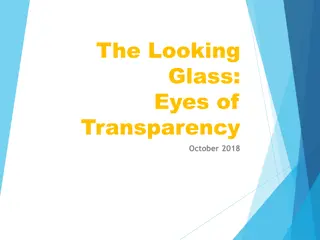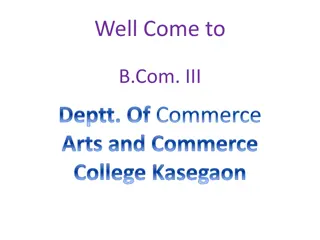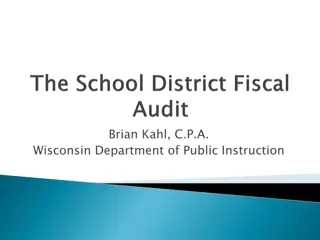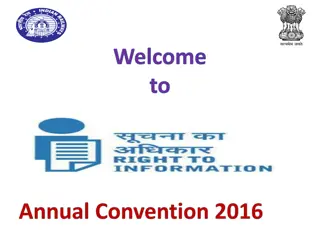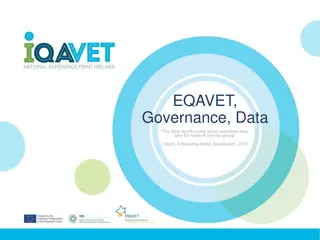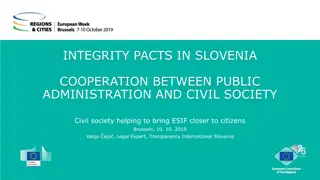Importance of Public Sector Auditing in Enhancing Accountability and Governance
The Auditor-General of South Africa plays a critical role in strengthening democracy through auditing public sector institutions. Public sector auditing ensures compliance, performance evaluation, and governance transparency, ultimately building public confidence. Key stakeholders include government bodies, oversight committees, and the public. Understanding legislative frameworks and international audit standards are vital for effective public sector auditing, with the aim of promoting accountability and oversight.
Download Presentation

Please find below an Image/Link to download the presentation.
The content on the website is provided AS IS for your information and personal use only. It may not be sold, licensed, or shared on other websites without obtaining consent from the author.If you encounter any issues during the download, it is possible that the publisher has removed the file from their server.
You are allowed to download the files provided on this website for personal or commercial use, subject to the condition that they are used lawfully. All files are the property of their respective owners.
The content on the website is provided AS IS for your information and personal use only. It may not be sold, licensed, or shared on other websites without obtaining consent from the author.
E N D
Presentation Transcript
Presentation by: Mr Thamsanqa Zikode Head of Portfolio Auditor-General South Africa (AGSA) Auditing in the public sector Tuesday 20 February 2024
Mission and Vision VISION To be recognised by all our stakeholders as a relevant Supreme Audit Institution (SAI) that enhances public sector accountability MISSION The Auditor-General of South Africa has a constitutional mandate and, as the supreme audit institution of South Africa, exists to strengthen our country s democracy by enabling oversight, accountability and governance in the public sector through auditing, thereby building public confidence
Why public sector auditing The mandate of the AGSA to audit public sector institutions, is derived from the Constitution of the Republic of South Africa (Constitution). In addition, the Public Audit Act (PAA) prescribes the functions of the AGSA. The scope of the annual audit in the public sector includes the audit of the financial statements, reported performance information and compliance with key legislation. Furthermore, the AGSA may perform discretionary engagements such as performance audits, investigations and special audits. In general, public sector auditing can be described as a systematic process of objectively obtaining and evaluating evidence to determine whether information or actual conditions conform to established criteria. Public sector auditing is essential because it provides those charged with governance, legislative and oversight bodies and the general public with assurance on published information as well as independent and objective assessments concerning the stewardship and performance of government policies, programmes or operations.
Why public sector auditing Key stakeholders in the public sector include Parliament, provincial legislatures and their respective committees, national and provincial treasuries, executive authorities, municipal councils, accounting officers and the public at large. When auditing in the public sector, it is important to have an understanding of the three different spheres of government, i.e. national, provincial and local, and how they interact with one another. Public sector institutions operate within a complex legislative framework. In that context, it is important for public sector auditors to understand the legislation applicable to the institutions they audit. The International Organisation of Supreme Audit Institutions (INTOSAI) operates as an umbrella organisation for government external audit community. It provides an institutionalised framework for supreme audit institutions (SAIs) to promote development, transfer knowledge and improve government auditing worldwide. The AGSA is a member of INTOSAI.
#CultureShift2030 Strategy aims to shift gears on public sector auditing Outcomes will not change materially if focus is not on shifting public sector culture Our commitment: to make a more direct, consistent and meaningful impact on improving lives of ordinary South Africans through #cultureshift2030 Strategic aspiration Theory of change Accountability ecosystem To have stronger, more direct and consistent impact on improving lived reality of ordinary South Africans Sustainably and efficiently shift public sector culture through insight, influence and enforcement Broad-based, effective network of stakeholders driving and deepening public sector accountability Doing nothing Doing no harm Doing good Doing harm Doing the basics
#CultureShift Strategy2030 Shift Public Sector Culture INSIGHT INSIGHT Data analytics Data driven audits Fraud analytics Benchmarking Research Stakeholder Insights and Needs Product Vision Real-Time audit approach AOPO linked to service delivery INFLUENCE Accountability Ecosystem campaign Culture Shift coalition program Strengthening oversight bodies Capacitation of staff on art of influence SUSTAINABLY / EFFICIENCY Quality impact and timely audits CWC, resource utilization & Ahluma Audit team & audit support collaboration CSO collaboration AOPO and DAM methodology Timely issued guidance Identification of data needs Audit Software Project (ASP) Review of methodology ENFORCE Quality and impactful MIs Effective MI process Efficiently managed MI process
Accountability ecosystem COOPERATIVE GOVERNANCE NATIONAL TREASURY INTERNAL AUDIT UNIT DEPARTMENTS WITH CONCURRENT FUNCTIONS EXECUTIVE AUTHORITY PARLIAMENT and OVERSIGHT COMMITTEES PUBLIC SERVICE AND ADMINISTRATION PLANNING, MONITORING AND EVALUATION PUBLIC ENTERPRISES AUDIT ACCOUNTING OFFICER/ AUTHORITY COMMITTEE SENIOR COORDINATING DEPARTMENTS MANAGEMENT PARLIAMENT and OVERSIGHT COMMITTEES OFFICIALS NATIONAL INFLUENCE ENFORCEMENT INSIGHT Leadership and decision makers Support and oversight PROVINCIAL PROVINCIAL LEGISLATURE and OVERSIGHT COMMITTEES Active citizenry OFFICIALS COORDINATING DEPARTMENTS INTERNAL AUDIT UNIT SENIOR MANAGEMENT ACCOUNTING OFFICER AUDIT PROVINCIAL LEGISLATURES and OVERSIGHT COMMITTEES MAYOR AND SPEAKER COMMITTEE PROVINCIAL TREASURIES COOPERATIVE GOVERNANCE OFFICES OF THE PREMIER MUNICIPAL PUBLIC ACCOUNTS COMMITTEE MUNICIPAL COUNCIL
Accountability ecosystem If AO/AA does not appropriately deal with MIs, our expanded mandate allowsus to: We have long reported on pervasive mismanagement/ leakage of public funds without consequences and our audit recommendations not receiving the required attention, with little or no improvement noted in the status quo, leading to our relevance being questioned Material irregularity Refer material irregularities to relevant public bodies for further investigation 1 meansanynon-compliance with, or contravention of, legislation, fraud, theft or a breach of a fiduciary duty identified during an audit performed under the Public Audit Act that resulted in or is likely to result in a material financial loss, the misuse or loss of a material public resource, or substantial harm to a public sector institution or the general public. Recommend actions in audit report to resolve the material irregularities 2 Take binding remedial action for failure to implement recommendations Public outcry for increased accountability and transparency, saw calls from parliamentary oversight structures, civil society, organised labour, media and the public at large for the AG to be empowered to hold accounting officers entrusted with public funds accountable for their actions Issue certificate of debt for failure to implement remedial action if financial loss was involved 3 The overall aim of our expanded mandate is to: The original expanded mandate now finding its basis in our strategy Instil a culture of accountability Improve the protection of resources Strengthen public sector institutions to better serve the people of South Africa Enhance public sector performance and encourage an ethical culture Enforcement Apply powers to directly and indirectly recover resources lost to the state and taxpayers, and ensure application of consequences for wrongdoing #cultureshift2030
What success looks like from auditors perspective Risk assessment 1 Agree terms of engagement Terms of the engagement are communicated and agreed to ensure a clear understanding of responsibilities of parties, objectives of audit, access to information and reports to be provided Plan audit Understanding of auditee is obtained for risk assessment purposes and audit plan is prepared Perform risk assessment procedures Risk assessment is performed to determine number and type of procedures to perform Good 2 Risk governance Perform procedures in terms of risk assessment Procedures are performed to obtain evidence that financial statements and annual performance report do not contain material misstatements and that key legislation has been complied with Reporting Prepare management report (not published) Report provided to auditee management and executive authority at end of audit details findings from procedures performed, identifies root causes of findings and makes recommendations for improvement 3 Prepare audit report (published) Report published in auditee s annual report informs those responsible for oversight, public and others of material misstatements in financial statements, material findings on usefulness and reliability of performance report, material noncompliance with key legislation in specific focus areas, and deficiencies in internal controls identified during audit.
Auditor-General South Africa Telephone: 012 426 8000 4 Daventry Street, Lynnwood Bridge Office Park, Lynnwood Manor, Pretoria
